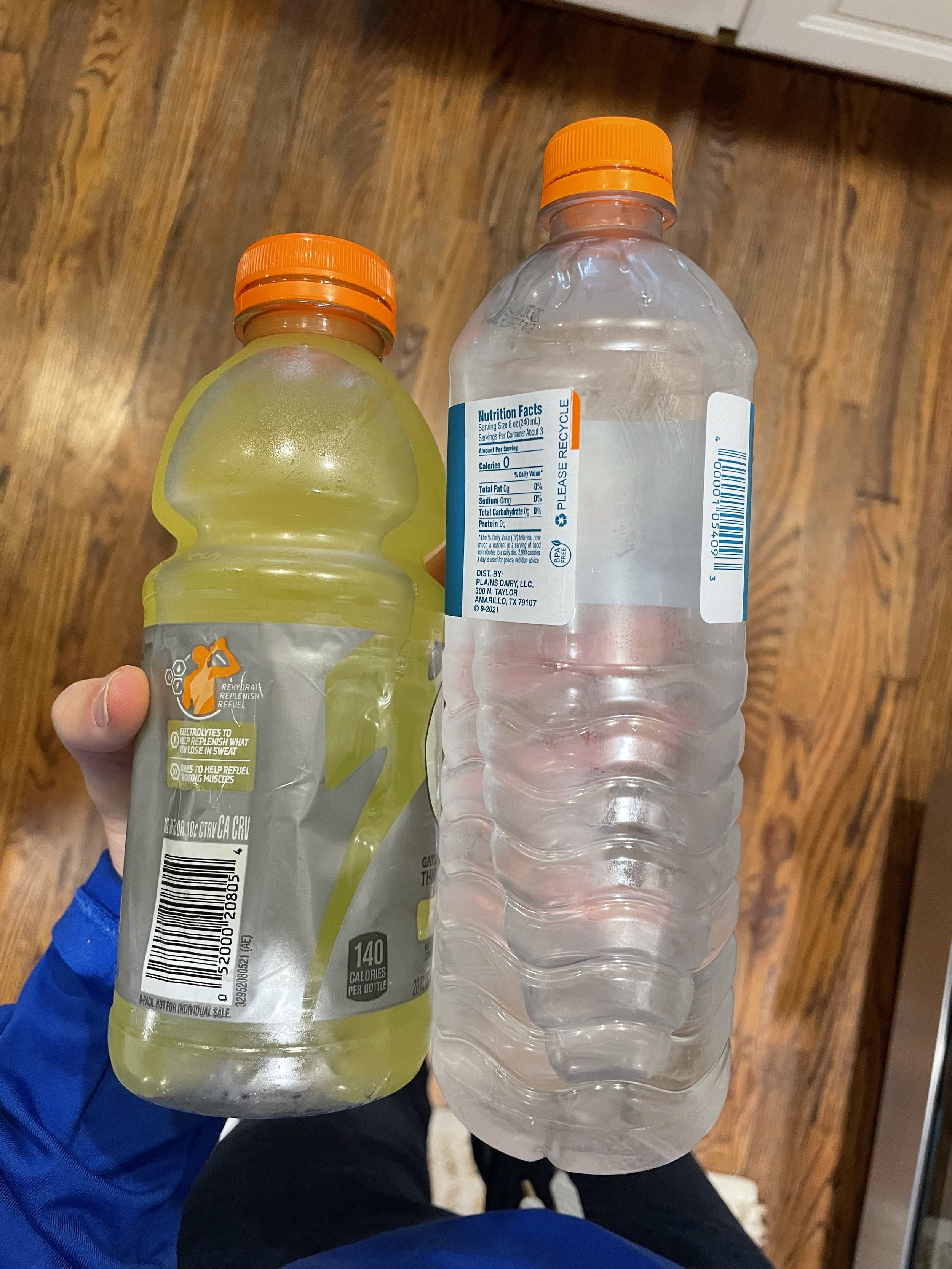Another common question I get from both parents and athletes and what I see a lot of confusion around is this topic of hydration beverages. Sports drink vs. electrolyte powder vs. water… what is the best choice? With all of the marketing and all the options and all of the different sports, it’s understandable why athletes are confused on what to drink and when.
In today’s blog, I’m going to break down some of the facts for you. These are questions I ask my private or group clients that I work with when helping them create a unique hydration plan and this is what you need to think about and when deciding the best hydration choice for your athlete.
5 MAIN POINTS TO CONSIDER WHEN CHOOSING A HYDRATION DRINK FOR THE YOUNG ATHLETE
HOW LONG WILL THE ATHLETE BE PLAYING / PRACTICING?
WHAT IS THE ENVIRONMENT / CLIMATE LIKE? (SUPER HOT, HUMID, COLD, MILD?)
WHAT TYPE OF ACTIVITY WILL THE ATHLETE BE DOING?
DID THE ATHLETE HAVE ANY PRE-EVENT FUEL?
HOW OLD IS THE ATHLETE? ARE THEY A HEAVY / SALTY SWEATER?
How you respond to each of these questions will determine which type of hydration drink is best for your athlete.
Three Categories of Hydration Drinks:
Water
Electrolyte Replacements
Sports Drinks
In my opinion, you can think of making your selection based on the general idea that the longer and more intense the practice / event becomes, the more you need in your drink. Let’s break it down by drink…
Water
The gold standard
Less than 60 minutes of activity in mild to moderate temperatures, with minimal sweating
Examples:
30 minute choreography class
45 minute soccer practice
40 minute figure skating freestyle session
electrolyte drink
An event of varying duration with minimal to moderate exertion but still heavy sweating
Basically, not enough energy is being exerted to require the carbs in a sports drink, but the athlete is sweating a lot and so benefits from replacing elextrolytes
Examples:
One baseball game
Practice for a more skill-based sport or position in the heat
sports drink
60 minutes or more of moderate to high-intensity activity
Extreme heat conditions
The athlete is a heavy and salty sweater
The athlete does not have a carb-rich snack on-hand during the event or the athlete has trouble tolerating solid forms of nutrition before and during events (ex: due to high nerves).
Examples:
A figure skater has 2 back-to-back 40-minute freestyle sessions followed by a 20-minute on-ice power class
A soccer athlete has a soccer game in the intense Texas summer heat OR has a tournament weekend.
A baseball player has a tournament without time to grab meals or carb-rich snacks in-between games.
A runner has a 1.5 hour cross country practice in the intense heat
A gymnast has a 4 hour morning practice and very little time to snack during the practice.
In addition to these facts, I thought I would share some common questions I get around this topic and how I respond…
COMMON QUESTIONS ABOUT HYDRATION DRINKS for YOUNG ATHLETES
What about all the sugar in sports drinks?
I know many athletes who have struggled through sessions underfueled with low energy stores (read; “low carb stores”) because they are trying to cut out sugar. While I understand this can come from a place of good intention, we must remember that, for the athlete, Sugar = Carbohydrate = Energy = PERFORMANCE!!
Right before an event or during an event is a place where the body actually benefits from sugar, from simple carbohydrate like that found in a regular sports drink! These can be especially helpful if you have trouble tolerating solids like fruit / bagels / bars around events.
I had an athlete come to me recently who was struggling with burnout not even half-way through soccer practices. They struggled with fatigue and some dizziness. As I worked through my material with them, a light went off. This athlete realized that they had cut out all sugar including any drinks with sugar completely. They added in some Gatorade before and during long practices and at our next session said they felt a huge difference in energy levels and the dizziness was gone. Success!
what about those who don’t drink sports drinks due to the dyes?
That’s ok! Did you know you can make your own sports drink? If you prefer to go a more diy route you can make your own! I’ve stumbled across a variety of recipes and am linking a few for you below…
What about this one that I’m seeing everywhere?
Do a comparison of the drinks you are considering. There are some trendy sports drinks out there, but when I look at the nutritionals, I find they are actually very low in key electrolytes like sodium. If your athlete truly needs a sports drink to (1) maintain energy levels and (2) replenish electrolytes lost in their sweat, remember that the main electrolyte they are wanting to replace is sodium!
what about energy drinks?
I can only say “No” to energy drinks. The caffeine amounts can be more than what is listed on the container and there is no recommended amount of caffeine for kids and teens in the US. I also think that many times an athlete will turn to an energy drink for energy when what they really need is MORE FOOD (ie, FUEL). To make matters worse there, energy drinks can blunt the appetite leaving a body already craving food and nutrients more underfueled. This is all I will say for now but I do plan to do a blog dedicated to energy drinks at a later date.
I hope you found this helpful today.
Hydration drinks can be confusing, but when the athlete gets it right, they really can feel an exciting difference!
If you think or know that your athlete is struggling with their hydration. If they need a more detailed plan and someone to guide them, I would love to chat with you about it. I work with my private clients and group program clients to create their unique fueling strategy all the time!
You can reach out to me at taylor@taylored-nutrition.com to schedule a quick call and see if working together would be a good next step!
Wishing you a well-fueled athlete,
Taylor

